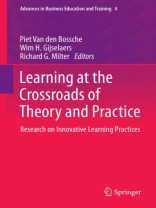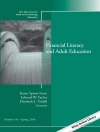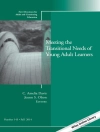Core concepts in education are changing. For example, professional performance or expertise is not uniquely the fruit of specialist knowledge acquired at professional schools, but the sum of influences exerted by a complex web of continuous learning opportunities for which an individual is well (or ill) prepared by their schools and their workplace. The key contributory factors to professional expertise are how professional schools connect to professional practice, how schools prepare graduates for continuous learning, and how the workplace endorses continuous development. Thus, the question this volume addresses—how to design learning and working environments that facilitate the integration of these three elements—is at the heart of contemporary pedagogical theory. The authors also ask a second vital question: how do we educate learners that go on to maximize their life’s learning opportunities by regulating their own ongoing learning?
Learning at the Crossroads of Theory and Practice argues that with the theory of learning at a crossroads, this is an unprecedented opportunity for learning about learning. The book sheds light on different elements of this challenge: integrating theory and practice in business education, generating and fully exploiting workplace learning opportunities, and enriching our classrooms by coupling theoretical knowledge with the richness of real-life experience.
Mục lục
Preface.- Learning at the crossroads of theory and practice: an overview.- Part I: Integrating theory and practice in business education.- Enhancing the academic internship learning experience for business education – a critical review and future directions; Maike Gerken et al.- Combining formal and non-formal learning for undergraduate management students based in London; Martin Rich and Ann Brown.- Work-based learning versus work-related learning – an exploration of the possibilities of work-related learning through a review of the Venture Matrix at Sheffield Hallam University, UK; David Laughton.- Part 2: Workplace learning.- What keeps low and high-qualified workers competitive: Exploring the Influence of Job Characteristics and Self-Directed Learning Orientation on Work-Related Learning; David Gijbels et al.- The Use of Personal Development Plans (PDPs) in organizations and the role of its perceived purpose; Nina Ketels et al.- Determinants, benefits and barriers of informal learning in the Netherlands; Marjolein Caniëls and Paul Kirschner.- Improving the Involvement of Higher Education Institutions in learning and innovation in a regional framework.- Herman van den Bosch and Marjolein Caniëls.- Part 3: Classroom enrichment.- On the Effectiveness of Economic Experiments as a Method of Teaching Undergraduates; Ilona Ebbers et al.- Integrating ICT in business education: using TPACK to reflect on two course redesigns; Bart Rienties and Danielle Townsend.- A longitudinal analysis of knowledge spillovers in the classroom; Nuria Hernandez Nanclares et al.- Part 4: Bridging the gap.- Opportunities for Technology Enhanced Remedial Maths; Venkat V.S.S. Sastry and Piers Mac Lean.- Effectiveness of a voluntary postsecondary remediation program in mathematics; Dirk Tempelaar et al.- Learning to Learn;Bernadette Pol.- EDi NEB news: Past, present and future of EDi NEB from the perspectives of participants and Management Team; Bart Rienties et al.- Index.












